HI5020 Corporate Accounting: Harvey Norman Limited Financial Analysis
VerifiedAdded on 2024/06/03
|19
|2878
|73
Report
AI Summary
This report provides a detailed analysis of Harvey Norman Limited's corporate accounting practices, focusing on the cash flow statement, other comprehensive income statement, and accounting for corporate income tax. It examines the three broad categories of cash flows (operating, investing, and financing activities) over three years, identifies items reported in the other comprehensive income statement, and explains the reasons why certain items are not reported in the income statement. The report also delves into the company's tax expense, deferred tax assets/liabilities, and the differences between income tax payable and income tax expense. It concludes with a discussion of interesting, confusing, or surprising aspects of the firm’s financial statements regarding the treatment of tax.
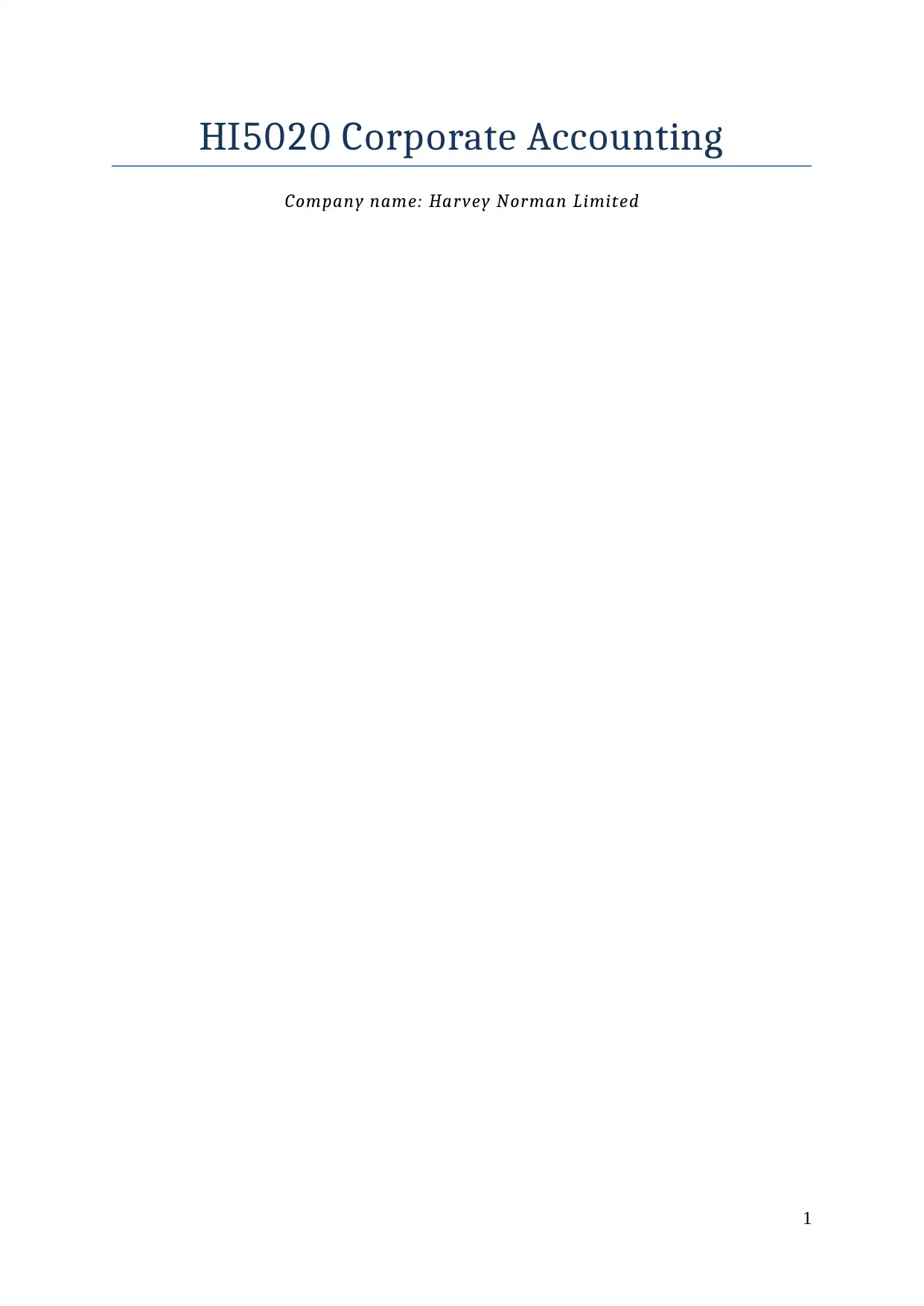
HI5020 Corporate Accounting
Company name: Harvey Norman Limited
1
Company name: Harvey Norman Limited
1
Paraphrase This Document
Need a fresh take? Get an instant paraphrase of this document with our AI Paraphraser
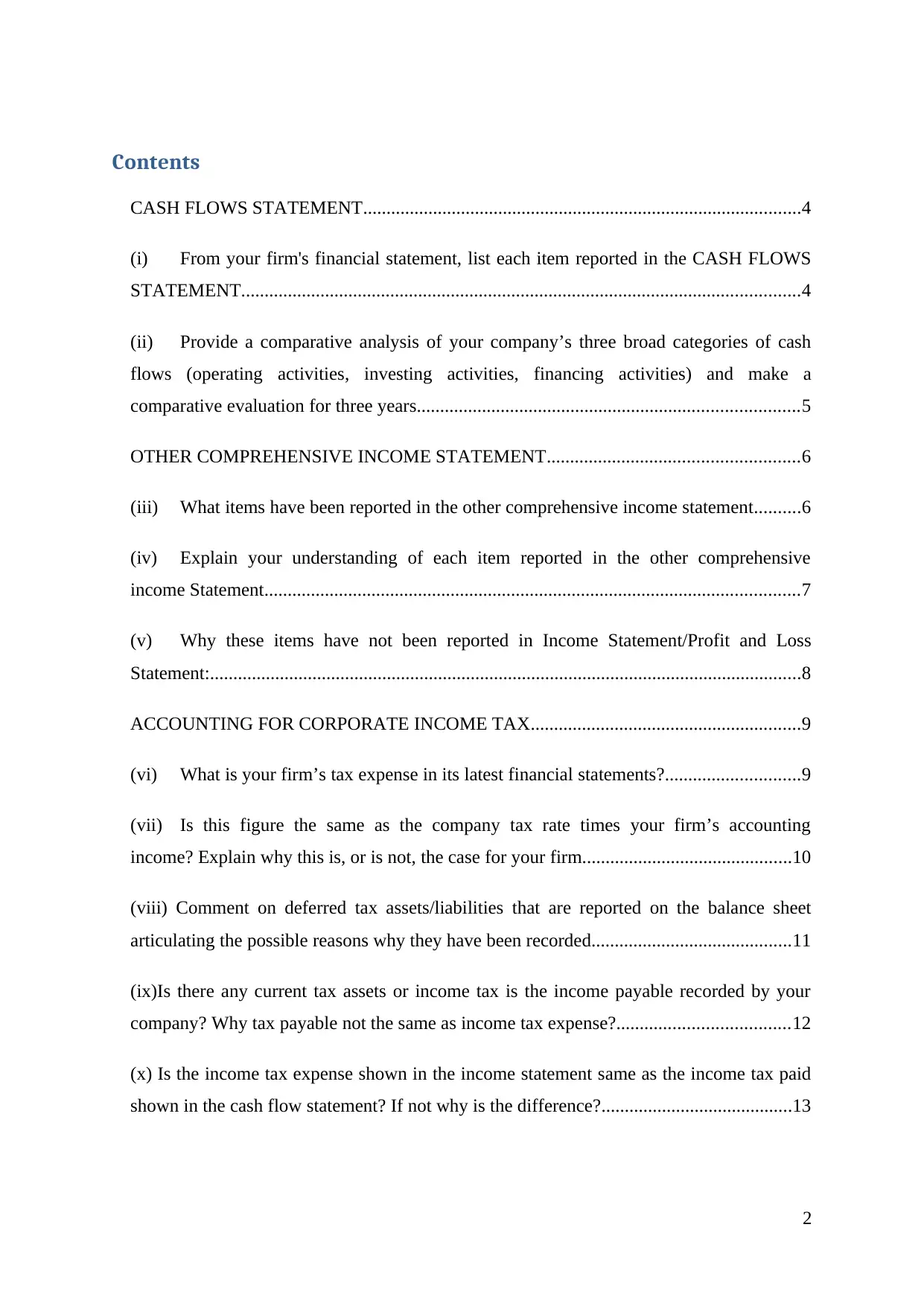
Contents
CASH FLOWS STATEMENT..............................................................................................4
(i) From your firm's financial statement, list each item reported in the CASH FLOWS
STATEMENT........................................................................................................................4
(ii) Provide a comparative analysis of your company’s three broad categories of cash
flows (operating activities, investing activities, financing activities) and make a
comparative evaluation for three years..................................................................................5
OTHER COMPREHENSIVE INCOME STATEMENT......................................................6
(iii) What items have been reported in the other comprehensive income statement..........6
(iv) Explain your understanding of each item reported in the other comprehensive
income Statement...................................................................................................................7
(v) Why these items have not been reported in Income Statement/Profit and Loss
Statement:...............................................................................................................................8
ACCOUNTING FOR CORPORATE INCOME TAX..........................................................9
(vi) What is your firm’s tax expense in its latest financial statements?.............................9
(vii) Is this figure the same as the company tax rate times your firm’s accounting
income? Explain why this is, or is not, the case for your firm.............................................10
(viii) Comment on deferred tax assets/liabilities that are reported on the balance sheet
articulating the possible reasons why they have been recorded...........................................11
(ix)Is there any current tax assets or income tax is the income payable recorded by your
company? Why tax payable not the same as income tax expense?.....................................12
(x) Is the income tax expense shown in the income statement same as the income tax paid
shown in the cash flow statement? If not why is the difference?.........................................13
2
CASH FLOWS STATEMENT..............................................................................................4
(i) From your firm's financial statement, list each item reported in the CASH FLOWS
STATEMENT........................................................................................................................4
(ii) Provide a comparative analysis of your company’s three broad categories of cash
flows (operating activities, investing activities, financing activities) and make a
comparative evaluation for three years..................................................................................5
OTHER COMPREHENSIVE INCOME STATEMENT......................................................6
(iii) What items have been reported in the other comprehensive income statement..........6
(iv) Explain your understanding of each item reported in the other comprehensive
income Statement...................................................................................................................7
(v) Why these items have not been reported in Income Statement/Profit and Loss
Statement:...............................................................................................................................8
ACCOUNTING FOR CORPORATE INCOME TAX..........................................................9
(vi) What is your firm’s tax expense in its latest financial statements?.............................9
(vii) Is this figure the same as the company tax rate times your firm’s accounting
income? Explain why this is, or is not, the case for your firm.............................................10
(viii) Comment on deferred tax assets/liabilities that are reported on the balance sheet
articulating the possible reasons why they have been recorded...........................................11
(ix)Is there any current tax assets or income tax is the income payable recorded by your
company? Why tax payable not the same as income tax expense?.....................................12
(x) Is the income tax expense shown in the income statement same as the income tax paid
shown in the cash flow statement? If not why is the difference?.........................................13
2
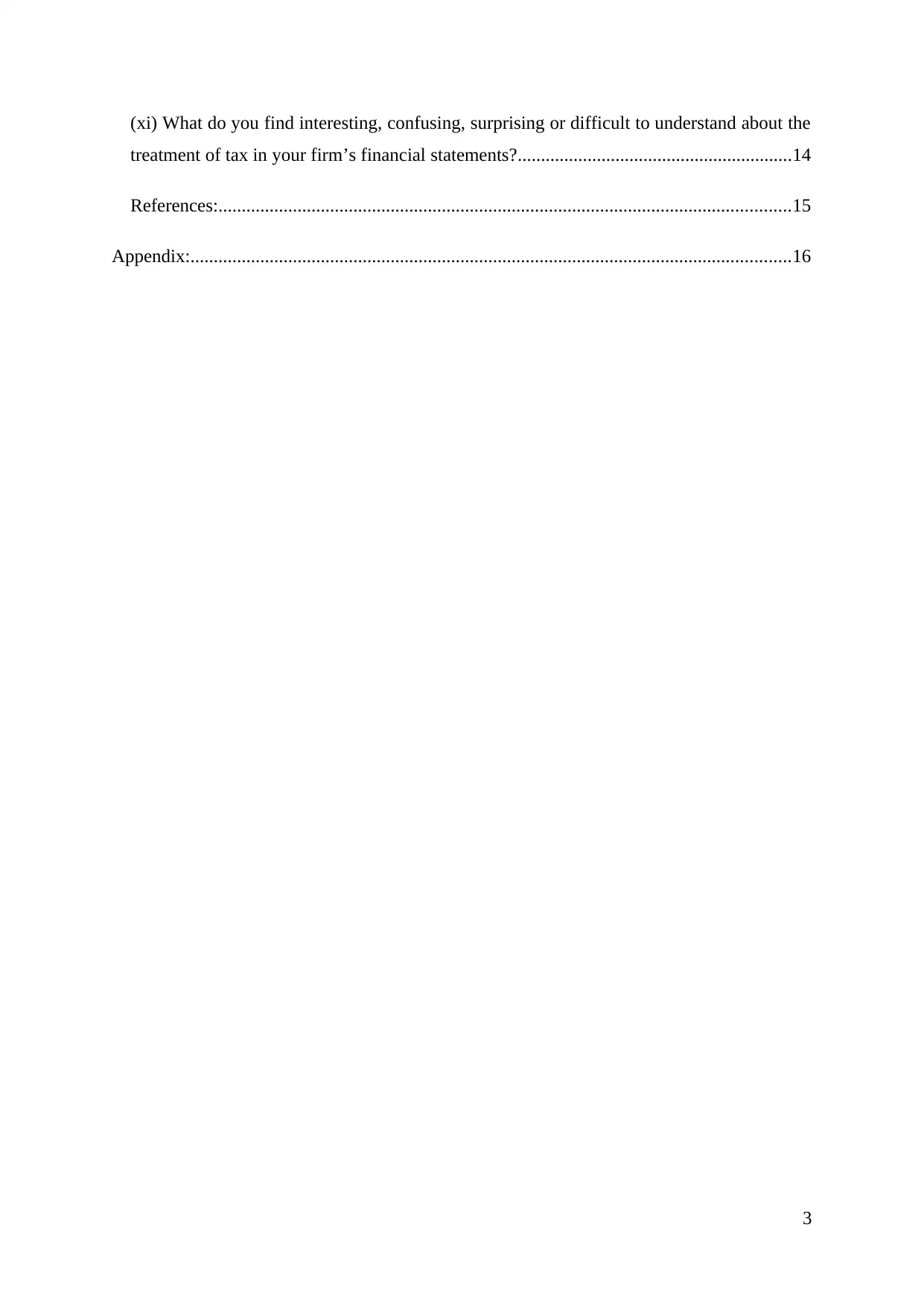
(xi) What do you find interesting, confusing, surprising or difficult to understand about the
treatment of tax in your firm’s financial statements?...........................................................14
References:...........................................................................................................................15
Appendix:.................................................................................................................................16
3
treatment of tax in your firm’s financial statements?...........................................................14
References:...........................................................................................................................15
Appendix:.................................................................................................................................16
3
⊘ This is a preview!⊘
Do you want full access?
Subscribe today to unlock all pages.

Trusted by 1+ million students worldwide
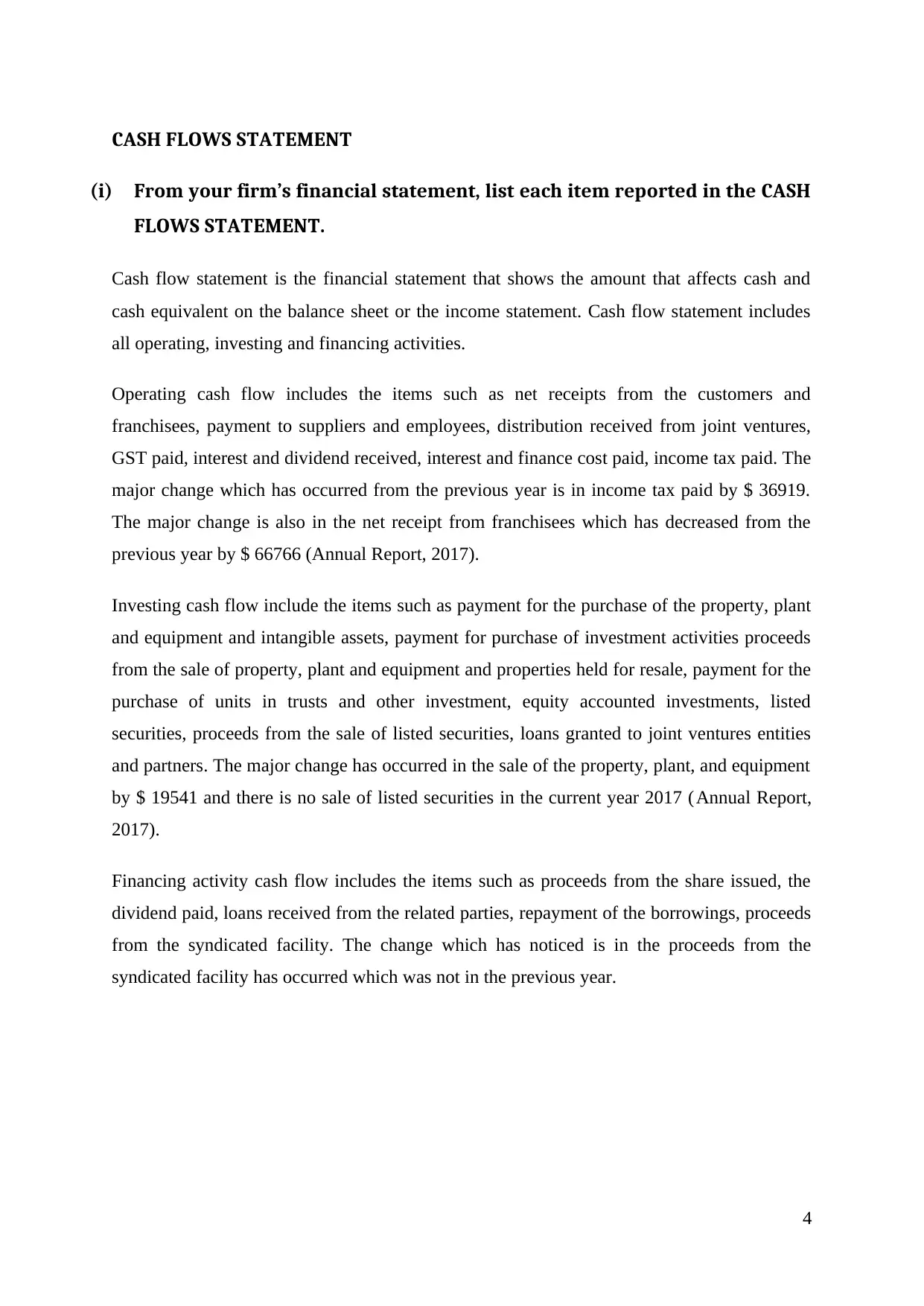
CASH FLOWS STATEMENT
(i) From your firm’s financial statement, list each item reported in the CASH
FLOWS STATEMENT.
Cash flow statement is the financial statement that shows the amount that affects cash and
cash equivalent on the balance sheet or the income statement. Cash flow statement includes
all operating, investing and financing activities.
Operating cash flow includes the items such as net receipts from the customers and
franchisees, payment to suppliers and employees, distribution received from joint ventures,
GST paid, interest and dividend received, interest and finance cost paid, income tax paid. The
major change which has occurred from the previous year is in income tax paid by $ 36919.
The major change is also in the net receipt from franchisees which has decreased from the
previous year by $ 66766 (Annual Report, 2017).
Investing cash flow include the items such as payment for the purchase of the property, plant
and equipment and intangible assets, payment for purchase of investment activities proceeds
from the sale of property, plant and equipment and properties held for resale, payment for the
purchase of units in trusts and other investment, equity accounted investments, listed
securities, proceeds from the sale of listed securities, loans granted to joint ventures entities
and partners. The major change has occurred in the sale of the property, plant, and equipment
by $ 19541 and there is no sale of listed securities in the current year 2017 (Annual Report,
2017).
Financing activity cash flow includes the items such as proceeds from the share issued, the
dividend paid, loans received from the related parties, repayment of the borrowings, proceeds
from the syndicated facility. The change which has noticed is in the proceeds from the
syndicated facility has occurred which was not in the previous year.
4
(i) From your firm’s financial statement, list each item reported in the CASH
FLOWS STATEMENT.
Cash flow statement is the financial statement that shows the amount that affects cash and
cash equivalent on the balance sheet or the income statement. Cash flow statement includes
all operating, investing and financing activities.
Operating cash flow includes the items such as net receipts from the customers and
franchisees, payment to suppliers and employees, distribution received from joint ventures,
GST paid, interest and dividend received, interest and finance cost paid, income tax paid. The
major change which has occurred from the previous year is in income tax paid by $ 36919.
The major change is also in the net receipt from franchisees which has decreased from the
previous year by $ 66766 (Annual Report, 2017).
Investing cash flow include the items such as payment for the purchase of the property, plant
and equipment and intangible assets, payment for purchase of investment activities proceeds
from the sale of property, plant and equipment and properties held for resale, payment for the
purchase of units in trusts and other investment, equity accounted investments, listed
securities, proceeds from the sale of listed securities, loans granted to joint ventures entities
and partners. The major change has occurred in the sale of the property, plant, and equipment
by $ 19541 and there is no sale of listed securities in the current year 2017 (Annual Report,
2017).
Financing activity cash flow includes the items such as proceeds from the share issued, the
dividend paid, loans received from the related parties, repayment of the borrowings, proceeds
from the syndicated facility. The change which has noticed is in the proceeds from the
syndicated facility has occurred which was not in the previous year.
4
Paraphrase This Document
Need a fresh take? Get an instant paraphrase of this document with our AI Paraphraser
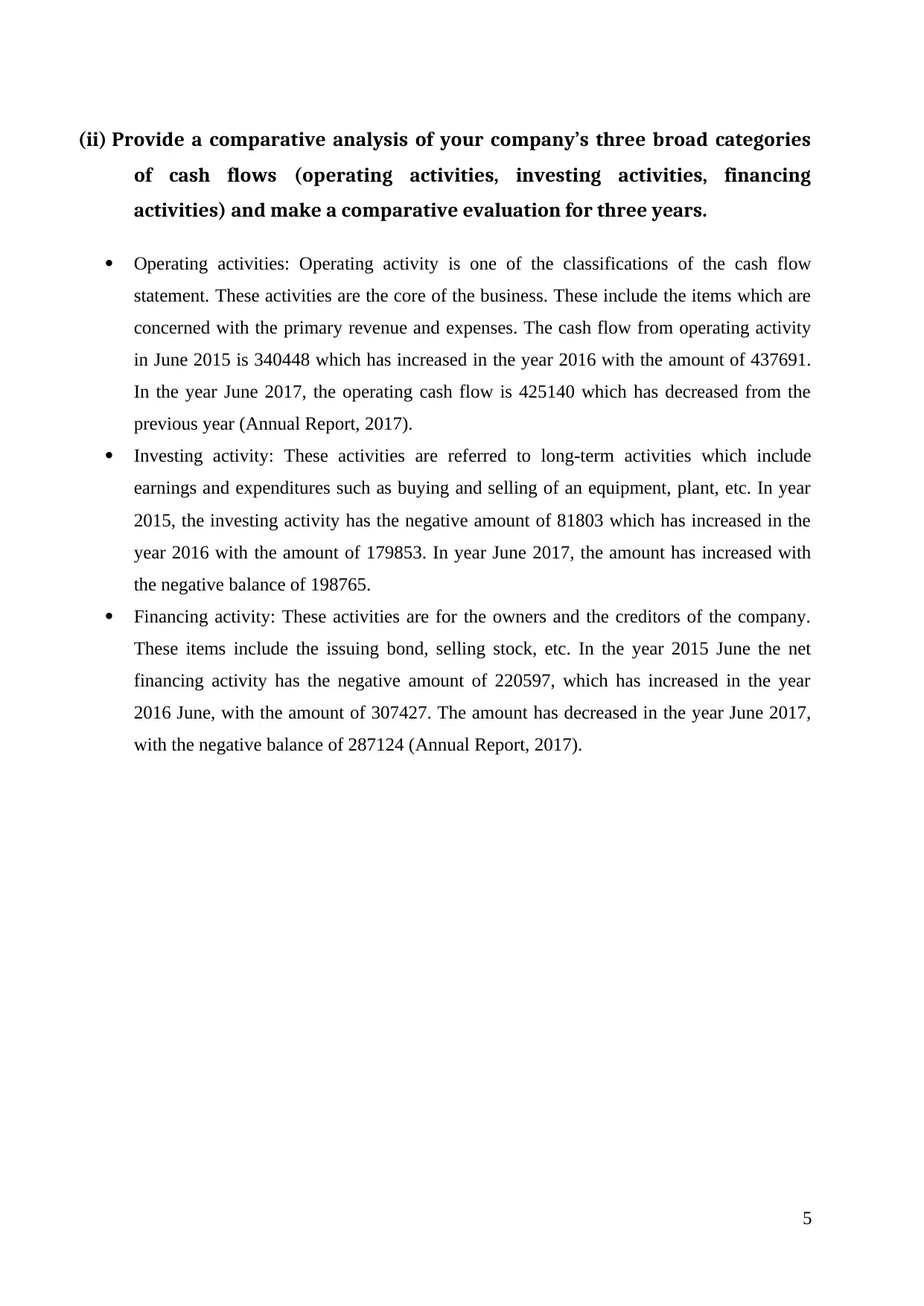
(ii) Provide a comparative analysis of your company’s three broad categories
of cash flows (operating activities, investing activities, financing
activities) and make a comparative evaluation for three years.
Operating activities: Operating activity is one of the classifications of the cash flow
statement. These activities are the core of the business. These include the items which are
concerned with the primary revenue and expenses. The cash flow from operating activity
in June 2015 is 340448 which has increased in the year 2016 with the amount of 437691.
In the year June 2017, the operating cash flow is 425140 which has decreased from the
previous year (Annual Report, 2017).
Investing activity: These activities are referred to long-term activities which include
earnings and expenditures such as buying and selling of an equipment, plant, etc. In year
2015, the investing activity has the negative amount of 81803 which has increased in the
year 2016 with the amount of 179853. In year June 2017, the amount has increased with
the negative balance of 198765.
Financing activity: These activities are for the owners and the creditors of the company.
These items include the issuing bond, selling stock, etc. In the year 2015 June the net
financing activity has the negative amount of 220597, which has increased in the year
2016 June, with the amount of 307427. The amount has decreased in the year June 2017,
with the negative balance of 287124 (Annual Report, 2017).
5
of cash flows (operating activities, investing activities, financing
activities) and make a comparative evaluation for three years.
Operating activities: Operating activity is one of the classifications of the cash flow
statement. These activities are the core of the business. These include the items which are
concerned with the primary revenue and expenses. The cash flow from operating activity
in June 2015 is 340448 which has increased in the year 2016 with the amount of 437691.
In the year June 2017, the operating cash flow is 425140 which has decreased from the
previous year (Annual Report, 2017).
Investing activity: These activities are referred to long-term activities which include
earnings and expenditures such as buying and selling of an equipment, plant, etc. In year
2015, the investing activity has the negative amount of 81803 which has increased in the
year 2016 with the amount of 179853. In year June 2017, the amount has increased with
the negative balance of 198765.
Financing activity: These activities are for the owners and the creditors of the company.
These items include the issuing bond, selling stock, etc. In the year 2015 June the net
financing activity has the negative amount of 220597, which has increased in the year
2016 June, with the amount of 307427. The amount has decreased in the year June 2017,
with the negative balance of 287124 (Annual Report, 2017).
5
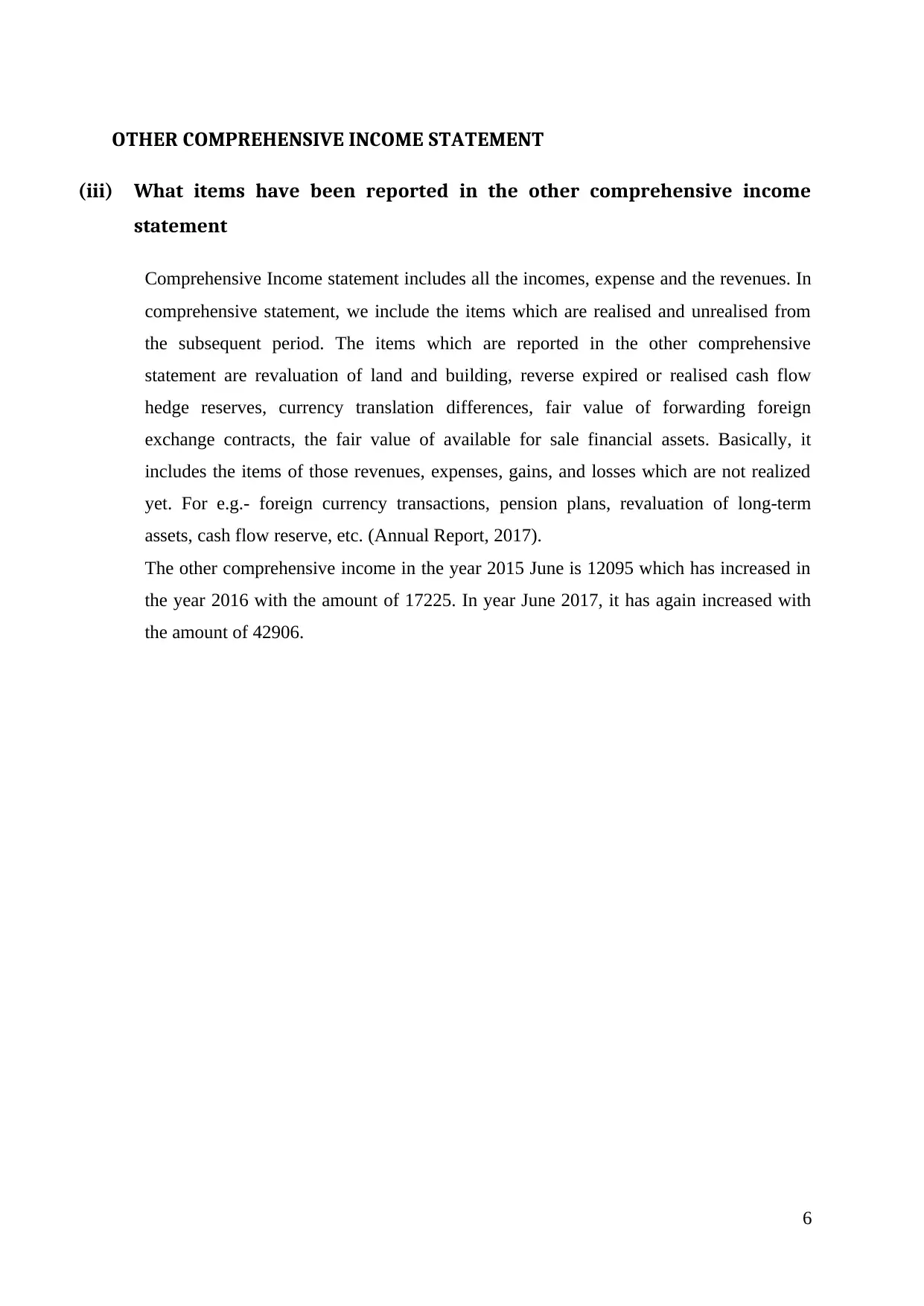
OTHER COMPREHENSIVE INCOME STATEMENT
(iii) What items have been reported in the other comprehensive income
statement
Comprehensive Income statement includes all the incomes, expense and the revenues. In
comprehensive statement, we include the items which are realised and unrealised from
the subsequent period. The items which are reported in the other comprehensive
statement are revaluation of land and building, reverse expired or realised cash flow
hedge reserves, currency translation differences, fair value of forwarding foreign
exchange contracts, the fair value of available for sale financial assets. Basically, it
includes the items of those revenues, expenses, gains, and losses which are not realized
yet. For e.g.- foreign currency transactions, pension plans, revaluation of long-term
assets, cash flow reserve, etc. (Annual Report, 2017).
The other comprehensive income in the year 2015 June is 12095 which has increased in
the year 2016 with the amount of 17225. In year June 2017, it has again increased with
the amount of 42906.
6
(iii) What items have been reported in the other comprehensive income
statement
Comprehensive Income statement includes all the incomes, expense and the revenues. In
comprehensive statement, we include the items which are realised and unrealised from
the subsequent period. The items which are reported in the other comprehensive
statement are revaluation of land and building, reverse expired or realised cash flow
hedge reserves, currency translation differences, fair value of forwarding foreign
exchange contracts, the fair value of available for sale financial assets. Basically, it
includes the items of those revenues, expenses, gains, and losses which are not realized
yet. For e.g.- foreign currency transactions, pension plans, revaluation of long-term
assets, cash flow reserve, etc. (Annual Report, 2017).
The other comprehensive income in the year 2015 June is 12095 which has increased in
the year 2016 with the amount of 17225. In year June 2017, it has again increased with
the amount of 42906.
6
⊘ This is a preview!⊘
Do you want full access?
Subscribe today to unlock all pages.

Trusted by 1+ million students worldwide
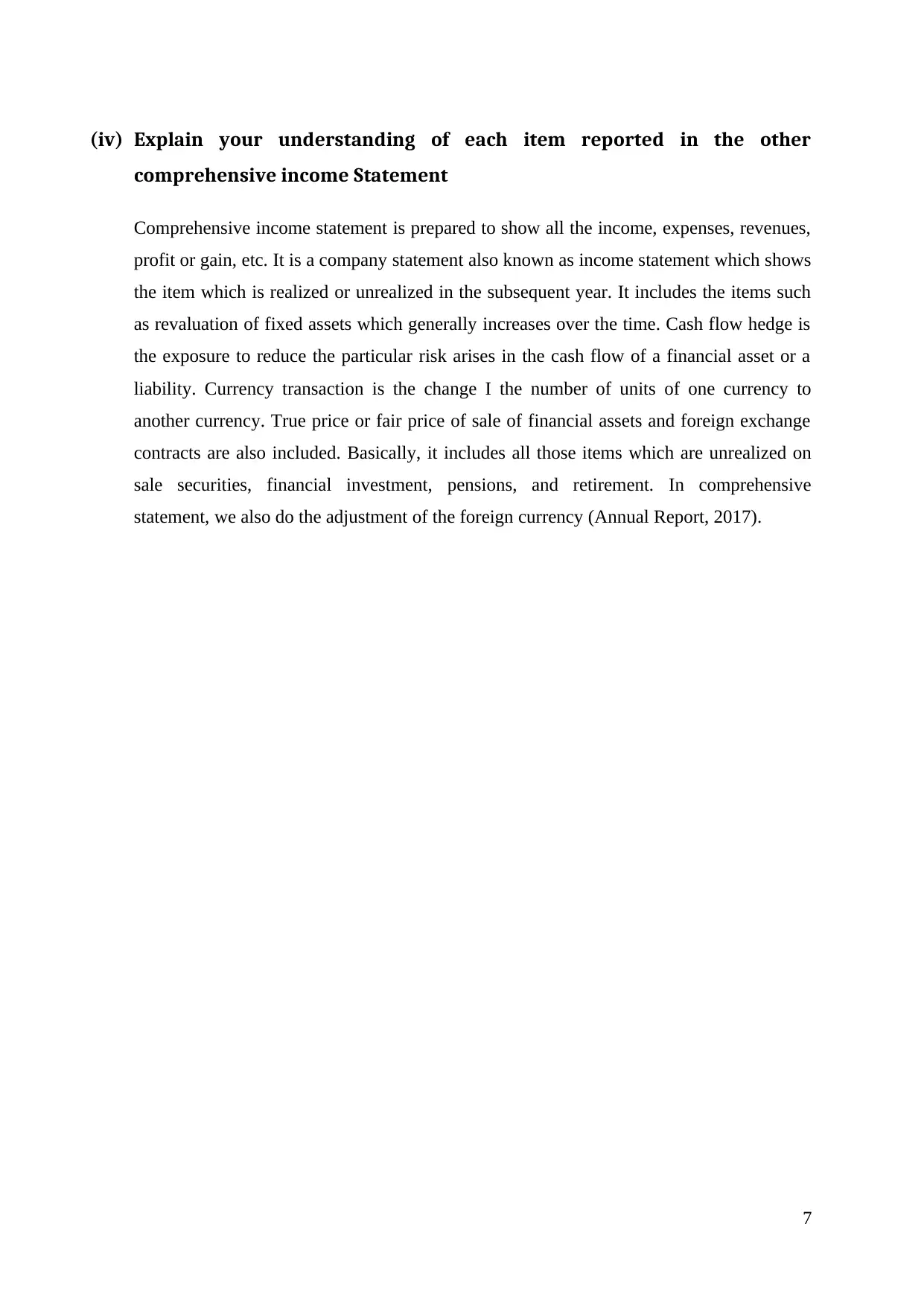
(iv) Explain your understanding of each item reported in the other
comprehensive income Statement
Comprehensive income statement is prepared to show all the income, expenses, revenues,
profit or gain, etc. It is a company statement also known as income statement which shows
the item which is realized or unrealized in the subsequent year. It includes the items such
as revaluation of fixed assets which generally increases over the time. Cash flow hedge is
the exposure to reduce the particular risk arises in the cash flow of a financial asset or a
liability. Currency transaction is the change I the number of units of one currency to
another currency. True price or fair price of sale of financial assets and foreign exchange
contracts are also included. Basically, it includes all those items which are unrealized on
sale securities, financial investment, pensions, and retirement. In comprehensive
statement, we also do the adjustment of the foreign currency (Annual Report, 2017).
7
comprehensive income Statement
Comprehensive income statement is prepared to show all the income, expenses, revenues,
profit or gain, etc. It is a company statement also known as income statement which shows
the item which is realized or unrealized in the subsequent year. It includes the items such
as revaluation of fixed assets which generally increases over the time. Cash flow hedge is
the exposure to reduce the particular risk arises in the cash flow of a financial asset or a
liability. Currency transaction is the change I the number of units of one currency to
another currency. True price or fair price of sale of financial assets and foreign exchange
contracts are also included. Basically, it includes all those items which are unrealized on
sale securities, financial investment, pensions, and retirement. In comprehensive
statement, we also do the adjustment of the foreign currency (Annual Report, 2017).
7
Paraphrase This Document
Need a fresh take? Get an instant paraphrase of this document with our AI Paraphraser
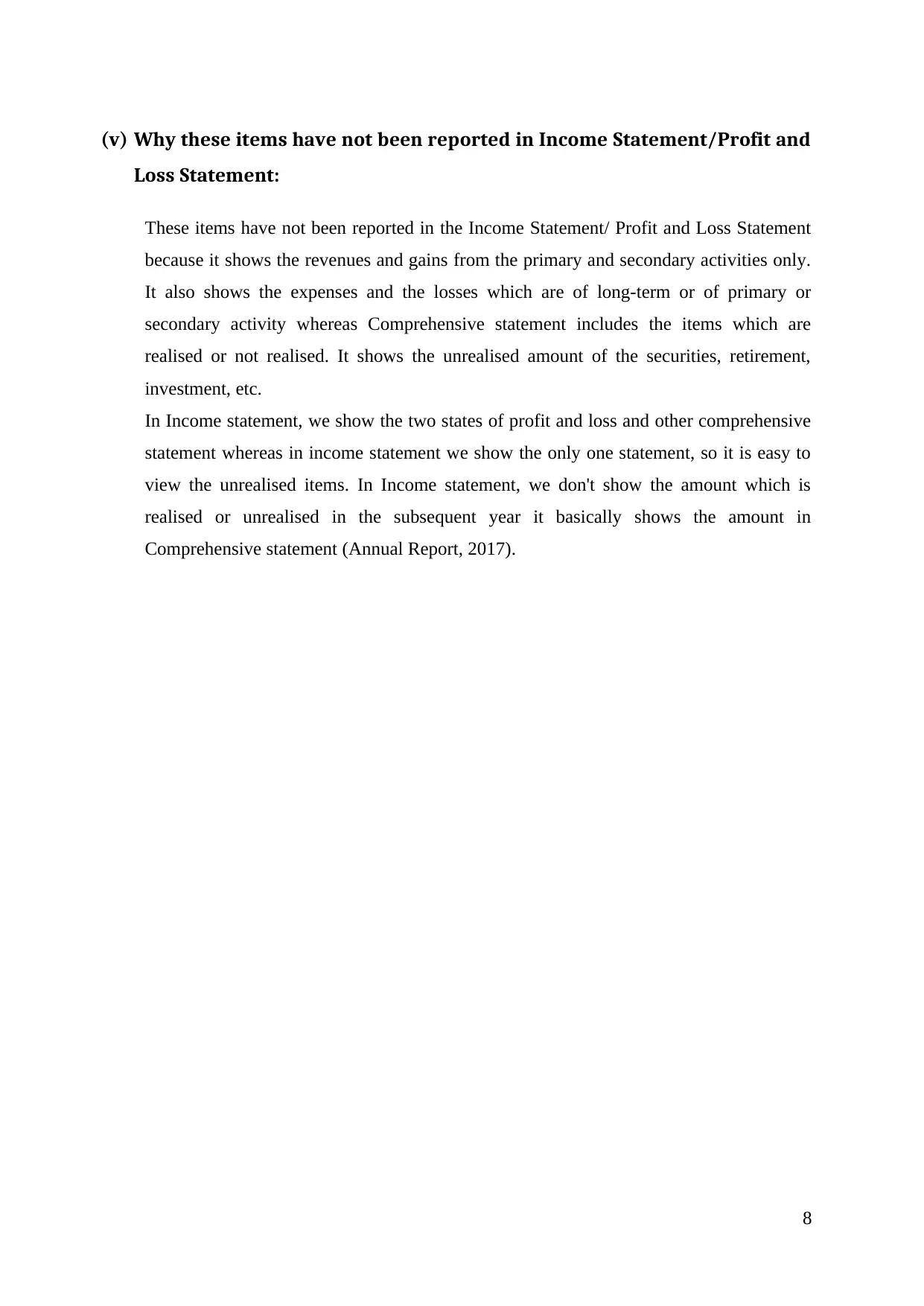
(v) Why these items have not been reported in Income Statement/Profit and
Loss Statement:
These items have not been reported in the Income Statement/ Profit and Loss Statement
because it shows the revenues and gains from the primary and secondary activities only.
It also shows the expenses and the losses which are of long-term or of primary or
secondary activity whereas Comprehensive statement includes the items which are
realised or not realised. It shows the unrealised amount of the securities, retirement,
investment, etc.
In Income statement, we show the two states of profit and loss and other comprehensive
statement whereas in income statement we show the only one statement, so it is easy to
view the unrealised items. In Income statement, we don't show the amount which is
realised or unrealised in the subsequent year it basically shows the amount in
Comprehensive statement (Annual Report, 2017).
8
Loss Statement:
These items have not been reported in the Income Statement/ Profit and Loss Statement
because it shows the revenues and gains from the primary and secondary activities only.
It also shows the expenses and the losses which are of long-term or of primary or
secondary activity whereas Comprehensive statement includes the items which are
realised or not realised. It shows the unrealised amount of the securities, retirement,
investment, etc.
In Income statement, we show the two states of profit and loss and other comprehensive
statement whereas in income statement we show the only one statement, so it is easy to
view the unrealised items. In Income statement, we don't show the amount which is
realised or unrealised in the subsequent year it basically shows the amount in
Comprehensive statement (Annual Report, 2017).
8
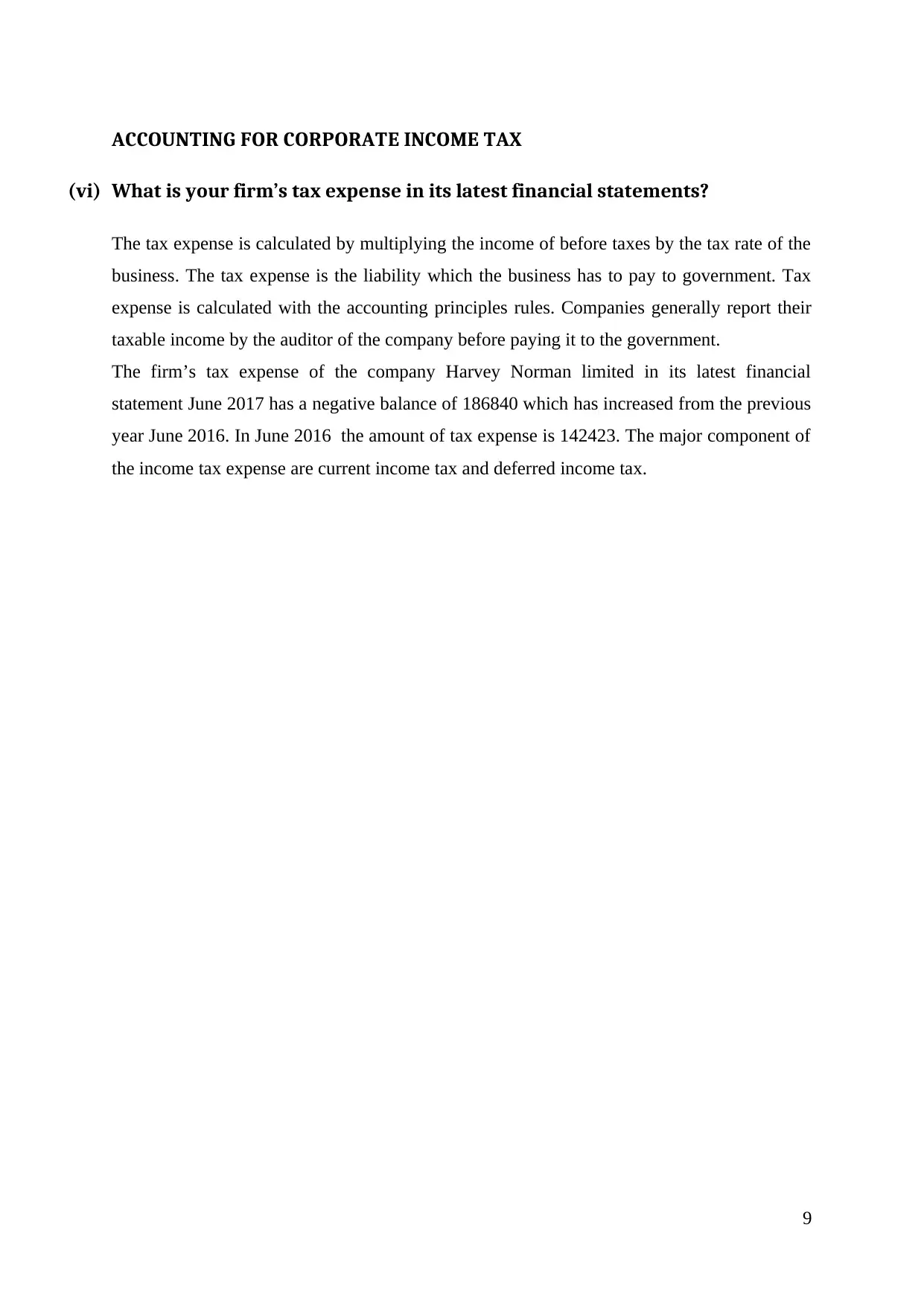
ACCOUNTING FOR CORPORATE INCOME TAX
(vi) What is your firm’s tax expense in its latest financial statements?
The tax expense is calculated by multiplying the income of before taxes by the tax rate of the
business. The tax expense is the liability which the business has to pay to government. Tax
expense is calculated with the accounting principles rules. Companies generally report their
taxable income by the auditor of the company before paying it to the government.
The firm’s tax expense of the company Harvey Norman limited in its latest financial
statement June 2017 has a negative balance of 186840 which has increased from the previous
year June 2016. In June 2016 the amount of tax expense is 142423. The major component of
the income tax expense are current income tax and deferred income tax.
9
(vi) What is your firm’s tax expense in its latest financial statements?
The tax expense is calculated by multiplying the income of before taxes by the tax rate of the
business. The tax expense is the liability which the business has to pay to government. Tax
expense is calculated with the accounting principles rules. Companies generally report their
taxable income by the auditor of the company before paying it to the government.
The firm’s tax expense of the company Harvey Norman limited in its latest financial
statement June 2017 has a negative balance of 186840 which has increased from the previous
year June 2016. In June 2016 the amount of tax expense is 142423. The major component of
the income tax expense are current income tax and deferred income tax.
9
⊘ This is a preview!⊘
Do you want full access?
Subscribe today to unlock all pages.

Trusted by 1+ million students worldwide
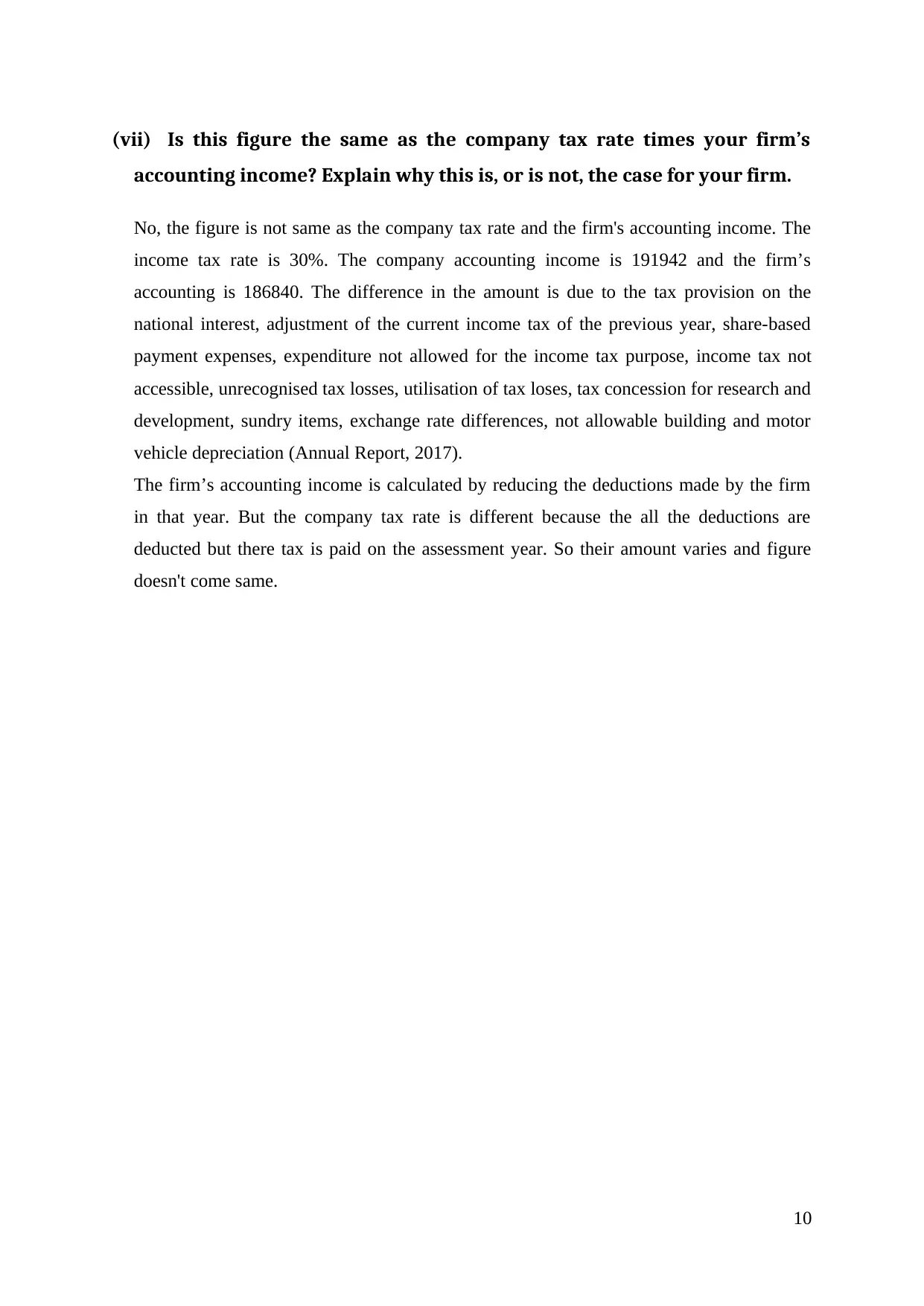
(vii) Is this figure the same as the company tax rate times your firm’s
accounting income? Explain why this is, or is not, the case for your firm.
No, the figure is not same as the company tax rate and the firm's accounting income. The
income tax rate is 30%. The company accounting income is 191942 and the firm’s
accounting is 186840. The difference in the amount is due to the tax provision on the
national interest, adjustment of the current income tax of the previous year, share-based
payment expenses, expenditure not allowed for the income tax purpose, income tax not
accessible, unrecognised tax losses, utilisation of tax loses, tax concession for research and
development, sundry items, exchange rate differences, not allowable building and motor
vehicle depreciation (Annual Report, 2017).
The firm’s accounting income is calculated by reducing the deductions made by the firm
in that year. But the company tax rate is different because the all the deductions are
deducted but there tax is paid on the assessment year. So their amount varies and figure
doesn't come same.
10
accounting income? Explain why this is, or is not, the case for your firm.
No, the figure is not same as the company tax rate and the firm's accounting income. The
income tax rate is 30%. The company accounting income is 191942 and the firm’s
accounting is 186840. The difference in the amount is due to the tax provision on the
national interest, adjustment of the current income tax of the previous year, share-based
payment expenses, expenditure not allowed for the income tax purpose, income tax not
accessible, unrecognised tax losses, utilisation of tax loses, tax concession for research and
development, sundry items, exchange rate differences, not allowable building and motor
vehicle depreciation (Annual Report, 2017).
The firm’s accounting income is calculated by reducing the deductions made by the firm
in that year. But the company tax rate is different because the all the deductions are
deducted but there tax is paid on the assessment year. So their amount varies and figure
doesn't come same.
10
Paraphrase This Document
Need a fresh take? Get an instant paraphrase of this document with our AI Paraphraser
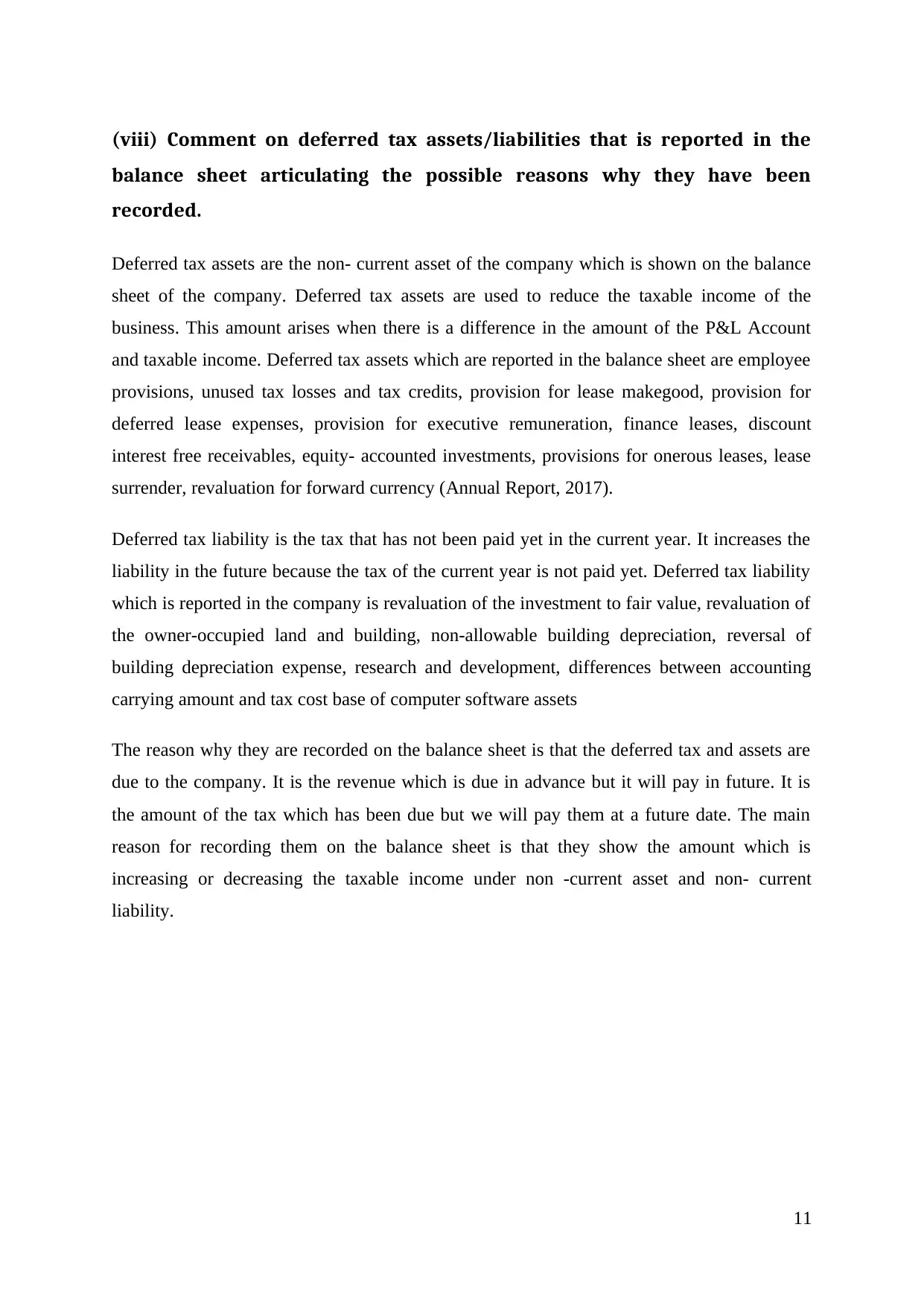
(viii) Comment on deferred tax assets/liabilities that is reported in the
balance sheet articulating the possible reasons why they have been
recorded.
Deferred tax assets are the non- current asset of the company which is shown on the balance
sheet of the company. Deferred tax assets are used to reduce the taxable income of the
business. This amount arises when there is a difference in the amount of the P&L Account
and taxable income. Deferred tax assets which are reported in the balance sheet are employee
provisions, unused tax losses and tax credits, provision for lease makegood, provision for
deferred lease expenses, provision for executive remuneration, finance leases, discount
interest free receivables, equity- accounted investments, provisions for onerous leases, lease
surrender, revaluation for forward currency (Annual Report, 2017).
Deferred tax liability is the tax that has not been paid yet in the current year. It increases the
liability in the future because the tax of the current year is not paid yet. Deferred tax liability
which is reported in the company is revaluation of the investment to fair value, revaluation of
the owner-occupied land and building, non-allowable building depreciation, reversal of
building depreciation expense, research and development, differences between accounting
carrying amount and tax cost base of computer software assets
The reason why they are recorded on the balance sheet is that the deferred tax and assets are
due to the company. It is the revenue which is due in advance but it will pay in future. It is
the amount of the tax which has been due but we will pay them at a future date. The main
reason for recording them on the balance sheet is that they show the amount which is
increasing or decreasing the taxable income under non -current asset and non- current
liability.
11
balance sheet articulating the possible reasons why they have been
recorded.
Deferred tax assets are the non- current asset of the company which is shown on the balance
sheet of the company. Deferred tax assets are used to reduce the taxable income of the
business. This amount arises when there is a difference in the amount of the P&L Account
and taxable income. Deferred tax assets which are reported in the balance sheet are employee
provisions, unused tax losses and tax credits, provision for lease makegood, provision for
deferred lease expenses, provision for executive remuneration, finance leases, discount
interest free receivables, equity- accounted investments, provisions for onerous leases, lease
surrender, revaluation for forward currency (Annual Report, 2017).
Deferred tax liability is the tax that has not been paid yet in the current year. It increases the
liability in the future because the tax of the current year is not paid yet. Deferred tax liability
which is reported in the company is revaluation of the investment to fair value, revaluation of
the owner-occupied land and building, non-allowable building depreciation, reversal of
building depreciation expense, research and development, differences between accounting
carrying amount and tax cost base of computer software assets
The reason why they are recorded on the balance sheet is that the deferred tax and assets are
due to the company. It is the revenue which is due in advance but it will pay in future. It is
the amount of the tax which has been due but we will pay them at a future date. The main
reason for recording them on the balance sheet is that they show the amount which is
increasing or decreasing the taxable income under non -current asset and non- current
liability.
11
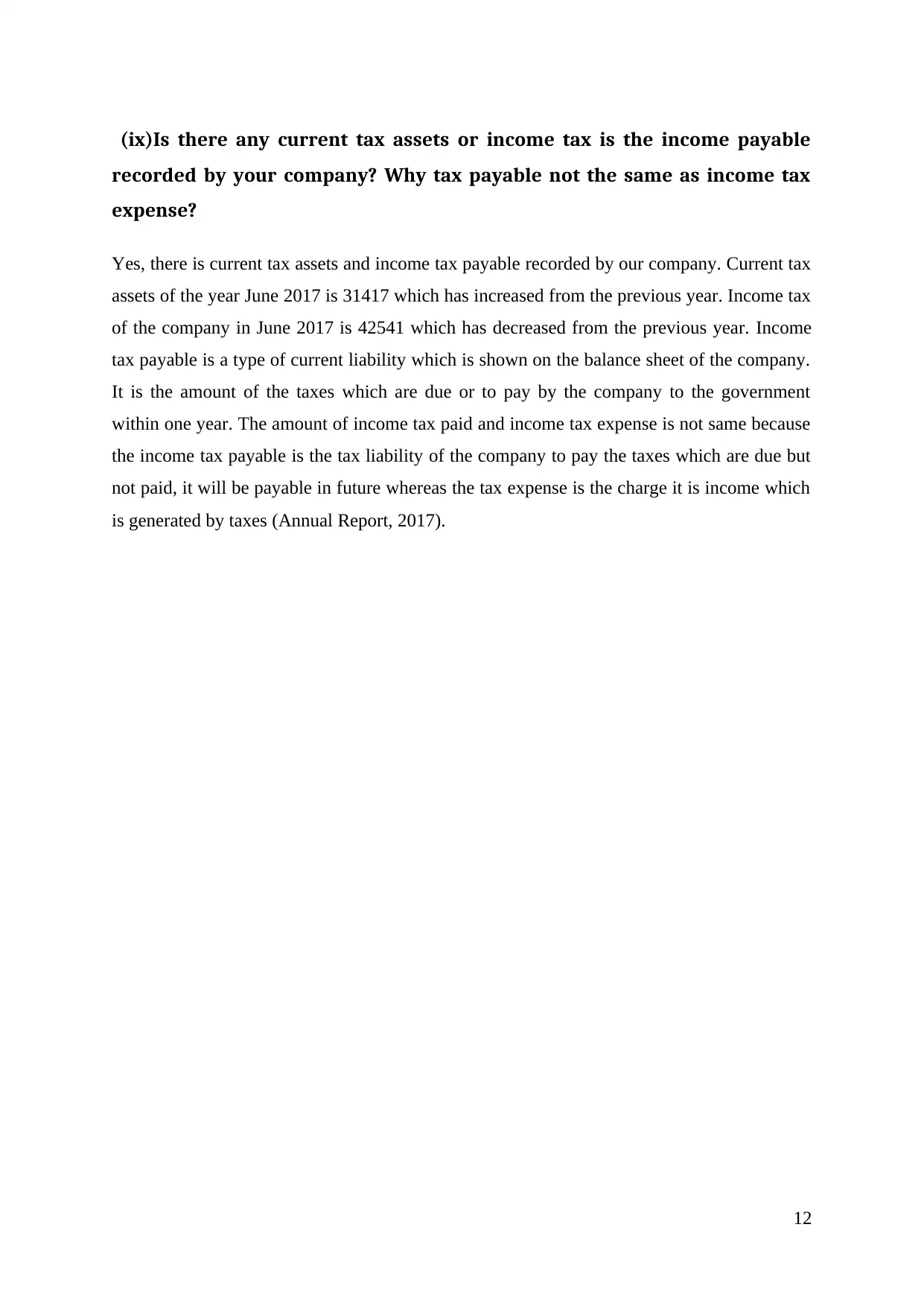
(ix)Is there any current tax assets or income tax is the income payable
recorded by your company? Why tax payable not the same as income tax
expense?
Yes, there is current tax assets and income tax payable recorded by our company. Current tax
assets of the year June 2017 is 31417 which has increased from the previous year. Income tax
of the company in June 2017 is 42541 which has decreased from the previous year. Income
tax payable is a type of current liability which is shown on the balance sheet of the company.
It is the amount of the taxes which are due or to pay by the company to the government
within one year. The amount of income tax paid and income tax expense is not same because
the income tax payable is the tax liability of the company to pay the taxes which are due but
not paid, it will be payable in future whereas the tax expense is the charge it is income which
is generated by taxes (Annual Report, 2017).
12
recorded by your company? Why tax payable not the same as income tax
expense?
Yes, there is current tax assets and income tax payable recorded by our company. Current tax
assets of the year June 2017 is 31417 which has increased from the previous year. Income tax
of the company in June 2017 is 42541 which has decreased from the previous year. Income
tax payable is a type of current liability which is shown on the balance sheet of the company.
It is the amount of the taxes which are due or to pay by the company to the government
within one year. The amount of income tax paid and income tax expense is not same because
the income tax payable is the tax liability of the company to pay the taxes which are due but
not paid, it will be payable in future whereas the tax expense is the charge it is income which
is generated by taxes (Annual Report, 2017).
12
⊘ This is a preview!⊘
Do you want full access?
Subscribe today to unlock all pages.

Trusted by 1+ million students worldwide
1 out of 19
Related Documents
Your All-in-One AI-Powered Toolkit for Academic Success.
+13062052269
info@desklib.com
Available 24*7 on WhatsApp / Email
![[object Object]](/_next/static/media/star-bottom.7253800d.svg)
Unlock your academic potential
Copyright © 2020–2026 A2Z Services. All Rights Reserved. Developed and managed by ZUCOL.





